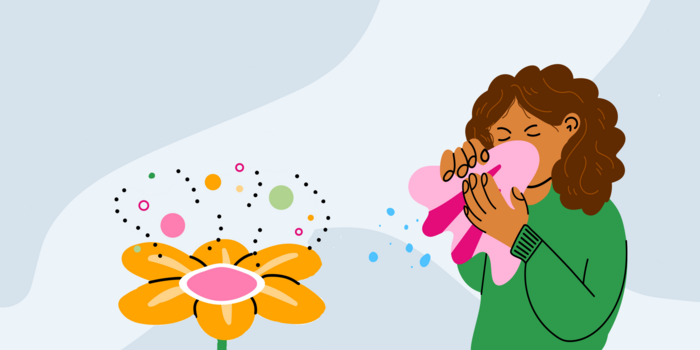Key points
- Spring allergies, most commonly triggered by pollen from trees and grasses, cause symptoms like runny nose, congestion, and itchy eyes.
- Recognizing and understanding specific allergy triggers can help manage and alleviate symptoms.
- Preventive measures include reducing exposure to allergens, checking local pollen forecasts, and maintaining cleanliness.
- Treatment options range from over-the-counter medications to prescription-strength drugs and immunotherapy, depending on the severity of symptoms.

As the weather warms up and nature starts coming back to life, many people find themselves battling the uncomfortable symptoms of seasonal allergies. Spring is the most common time for allergies, according to the American College of Allergy, Asthma, and Immunology (ACAAI). This is because trees and grasses begin to start to release pollen into the air quickly, and pollen is what triggers allergies in most people.
Whether you're a long-time allergy sufferer or just looking for information on how to cope with spring allergies, you'll find helpful insights and practical strategies below.
What Causes Spring Allergies?
Spring allergies are primarily caused by the release of pollen from trees and grasses, according to Medical News Today. They explain that as the weather warms up, plants begin to bloom and produce pollen, which is then dispersed into the air. When people with allergies inhale this pollen, their immune systems perceive it as a threat and release histamines, leading to allergy symptoms.
The abundance of pollen in the air during spring makes it a challenging time for allergy sufferers. Understanding your specific triggers can help you manage and alleviate your spring allergy symptoms best.
What Are Spring Allergies’ Typical Symptoms?
Common spring allergies include:
- Runny nose
- Congestion
- Watery eyes
- Sneezing
- Coughing
- Itchy eyes and nose
- Dark circles under the eyes from lack of sleep or itchy eyes
- Check your local pollen forecast and limit your time outside when pollen levels are high
- Keep your lawn grass short or consider a grass-free landscaping such as a rock garden
- Wear a dust mask when mowing the lawn and gardening which can expose you to a lot of pollen
- Avoid being around dead or rotting logs which can harbor allergens
- Keep all the windows closed if possible and use allergy-friendly filters on air conditioning units
- Bathe and wash your hair daily to remove pollen and other allergens from being stuck in your hair
- Wash your bed linen at least once a week, and more often if you have severe allergies
- Change and wash your clothes after being outdoors and keep your dirty clothes out of your bedroom so you don't expose yourself to pollen in the night
- Dry clothes in a dryer if possible instead of outdoors
- Remove your shoes before entering the house so you don’t track in pollen
- Wear hats and sunglasses when outside to limit pollen entering the eyes and landing in the hair
- Vacuum floors and dust surfaces at least once a week (and more often if necessary)
- Antihistamines are available in pill, nasal spray, or liquid forms and can help with itchy eyes, runny noses, and sneezing
- Nasal corticosteroids which is a type of nasal spray that reduces inflammation
- Decongestants, which work by shrinking the lining of the nasal passages to reduce stuffiness
- Eye drops, which are used for short-term relief of redness, itchiness, and swelling
- Allergy shots: A popular treatment option involving regular injections of allergens to desensitize the immune system over time.
- Sublingual immunotherapy (SLIT): This involves placing tablets containing allergens under the tongue to help the body build tolerance to specific allergens.
These treatment options are better for long-term treatment of severe allergies, especially for people with conditions like Hay Fever. and can only be done under the direction and supervision of a physician according to Medical News Today.
How to Diagnose a Spring Allergy?
There are 3 allergy tests that are commonly used to diagnose seasonal allergies, according to Medical News Today. Your primary care doctor may be able to conduct some allergy testing, or they may refer you to an allergist, who has specialized expertise in diagnosing and treating allergies. The three main ways to test for allergies include:
- A skin prick test: Your doctor will scratch a small amount of suspected pollen allergen into your skin and then observe for any reaction. Results usually take around 10–20 minutes, according to Medical News Today.
- Intradermal testing: This type of testing is usually more sensitive than a skin prick test. It involves the doctor injecting a tiny amount of the pollen allergen under the skin to see if there is a reaction.
- Blood test: This type of testing uses a blood sample mixed with the suspected allergen (such as tree pollen, grass pollen, or ragweed pollen) to see if the number of antibodies produced increases.
These tests are usually done in conjunction with a physical examination of your seasonal allergy symptoms and talking about your environment, family medical history, and other possible contributing factors.
Urgent Care Near Me
If you're experiencing severe allergy symptoms (also known as allergic rhinitis) that you can’t seem to manage your allergy symptoms with over-the-counter medications, going to an urgent care clinic can help!
Urgent care clinics can provide prompt medical attention and relief for individuals struggling with spring allergies. Additionally, if you're unsure whether your symptoms are due to allergies or another condition, urgent care providers can determine the cause of your symptoms and recommend the most effective treatment.
You can find your nearest urgent care clinic using Solv.
Sources:
Seasonal Allergies. (March 31, 2024) https://acaai.org/allergies/allergic-conditions/seasonal-allergies/
The Spring Allergy. (March 31, 2024) https://www.webmd.com/allergies/spring-allergies
Spring Allergies. (March 31, 2024) https://www.medicalnewstoday.com/articles/spring-allergies
- A skin prick test: Your doctor will scratch a small amount of suspected pollen allergen into your skin and then observe for any reaction. Results usually take around 10–20 minutes, according to Medical News Today.
Prescription-strength medications are also available in the form of antihistamines and nasal corticosteroids for those who have more severe or persistent symptoms, according to WebMD.
Immunotherapy
Getting immunotherapy is a way of training your body not to mount an allergic reaction to something. This can be done in two different ways, according to Medical News Today:
- Allergy shots: A popular treatment option involving regular injections of allergens to desensitize the immune system over time.
WebMD notes that these symptoms are often triggered by your body's immune response to tree pollen and pollen from grasses and weeds, which is abundant in the air during the spring and summer months — especially the spring. It's important to recognize these typical symptoms because you can start taking preventive measures to minimize your discomfort during the allergy season. If prevention isn't enough, you can try over-the-counter treatments and then prescription treatment or allergy shots if nothing else seems to work.
How to Prevent Spring Allergies?
Reducing your exposure to whatever you are allergic to is another great way to manage your symptoms, according to WebMD. They recommend the following:
How Can You Treat Spring Allergies?
There are several treatment options for you if you’re struggling with spring allergies. Some of the most popular options, according to the Medical News Today, include:
Over-the-Counter Medication
FAQs
What causes spring allergies?
Spring allergies are primarily caused by the release of pollen from trees and grasses. When inhaled, the immune system perceives it as a threat and releases histamines, leading to allergy symptoms.
What are the common symptoms of spring allergies?
Common symptoms include a runny nose, congestion, watery eyes, sneezing, coughing, and itchy eyes and nose.
How can I prevent spring allergies?
Prevention strategies include checking local pollen forecasts, limiting time outside when pollen levels are high, keeping windows closed, and maintaining cleanliness to remove pollen.
What are the treatment options for spring allergies?
Treatment options include over-the-counter medications like antihistamines and decongestants, prescription-strength drugs, and immunotherapy, which involves regular injections of allergens to desensitize the immune system.
How can I diagnose a spring allergy?
Allergy tests such as skin prick tests, intradermal testing, and blood tests can help diagnose spring allergies. These are usually done in conjunction with a physical examination and a discussion about your environment and family medical history.









